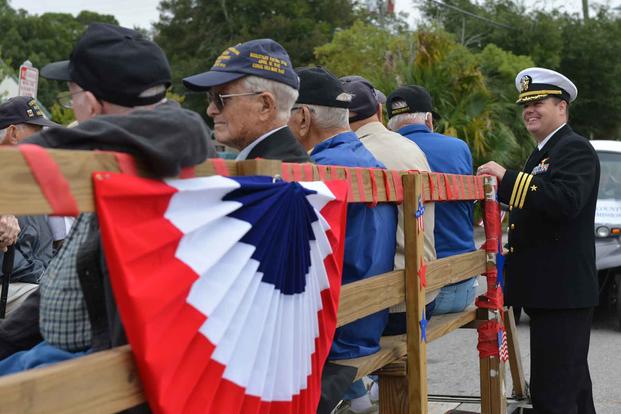After a yearlong delay, veterans from World War II through Vietnam who need around-the-clock care from a loved one can apply for the Department of Veterans Affairs' family caregiver program, starting Oct. 1.
The VA announced Friday in the Federal Register that the program's expansion to include veterans who served on or before May 7, 1975, will begin with several changes that affect all who are enrolled, including current veterans and caregivers.
Read Next: 1 Marine Dead, 8 More Missing After AAV Accident Off California Coast
Under the new rules, veterans with a single or combined service-connected disability rating of 70% or higher, who also meet certain criteria and served before the 1975 date, are eligible to apply in October.
The VA will determine whether the applicant fits into one of two categories: Level 1, those who need substantial caregiving but are more capable than the most disabled cohort; or Level 2, those who are not able to "self-sustain in the community," meaning they require continuous supervision and help with three or more daily activities.
According to the VA, the stipend amount for the Program of Comprehensive Assistance for Family Caregiving will be dependent on geography and level. A caregiver in Dallas, supporting a Level 2 veteran, for example, would receive a monthly stipend of roughly $2,803.17. For someone caring for a Level 1 veteran, it would be $1,751.98.
Those currently enrolled in the program and those with a pending application will be reassessed under the new eligibility criteria over the next year, according to the VA.
If a reassessment results in an increased stipend, the veteran and their caregiver would receive the new amount, as well as a lump sum of retroactive pay back to Oct. 1, 2020. If the assessment determines the veteran is eligible for a decreased amount, the VA will give them notice by Oct. 2, 2021, and the decrease would go into effect "no earlier than 60 days" after they receive the notice.
For veterans who are currently enrolled but deemed during the reassessment to be ineligible under the new criteria, the VA will inform the veteran at or around Oct. 1, 2021, and their benefits would continue for 90 days following discharge from the program.
As part of the assessment, the VA will examine the level of activity veterans can do themselves each day, taking into account whether they can dress themselves, bathe, groom themselves, adjust a prosthetic or orthotic device on their own, go to the bathroom without assistance, feed themselves or need help moving around their homes.
The 2018 VA Mission Act required the department to expand its caregiver program to include combat veterans from previous wars. The current program, which was established in 2011, serves combat-wounded veterans of the post-9/11 era and has helped 38,000 former service members at a cost of roughly $900 million annually.
VA Secretary Robert Wilkie said Friday that the new regulation allows the most "vulnerable veterans to stay home with loved ones for as long as possible."
"The expanded regulation addresses the complexity and expense of keeping Veterans at home with their families who provide personalized care," Wilkie said in a release.
Under the Mission Act, the program will undergo another expansion on Oct. 1, 2022, to include combat veterans who served between 1975 and Sept. 11, 2001.
In addition to expanding eligibility beyond those who are combat wounded, the new regulations define new procedures for discharging former service members from the program, standardize operating procedures and provide new training for staff and caregivers. The changes also will give caregivers access to financial planning and legal services.
The program was the target of a VA Office of Inspector General investigation in 2018 that found problems with how the department managed the program, accepted applicants and monitored the health of those who were discharged from the program.
The IG found that the department also paid out $4.8 million to caregivers of veterans who weren't eligible for the program.
Last year, four spouses and two fiancees of veterans eligible for the program sued the VA for allegedly improperly revoking their benefits or denying them.
More information on the VA's caregiver program can be found on its website.
-- Patricia Kime can be reached at Patricia.Kime@Monster.com. Follow her on Twitter @patriciakime.
Related: Military Caregivers File Lawsuit, Saying VA Improperly Revoked Benefits














